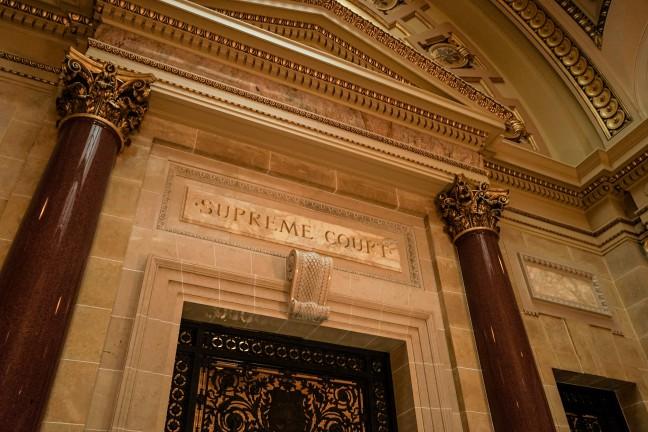Jan. 29, during a forum at the Milwaukee Bar Association, Wisconsin Supreme Court candidate Jill Karofsky accused incumbent Supreme Court Justice Dan Kelly of being corrupt, using his consistent conservative rulings as evidence. Kelly and his campaign accused Karofsky of slander and demanded an immediate apology — one Karofsky has not made.
One of the cases Karofsky is referring to is from 2017, when the Wisconsin Institute of Law and Liberty sued the town of Eau Claire for creating an illegal tax to fund a public project. The facts of the case show in 2014 the city of Eau Claire planned and constructed a residence hall before implementing the tax. WILL argued this broke tax law since the tax wasn’t necessary for the construction of the building.
The case made it to the Wisconsin Supreme Court where a 5-2 majority opinion dismissed the case. Kelly was one of the two judges who dissented.
“Our court (and the court of appeals) sidestepped the complex substantive issues, incorrectly applied the law, and deprived Plaintiffs of their rights,” Kelly said in his dissenting opinion.
Karofsky alleges Kelly’s corruption stems from the fact that he has received campaign contributions from members of WILL, and that’s why he ruled in their favor. But this argument falls apart when one considers liberal Justice Anne Walsh Bradley joined him in dissent. Not only did Walsh Bradley vote with Kelly, but she also came out and said she agreed with Kelly’s decision to stay on the case. Kelly’s ruling on this case was ideological, not partisan.
This public spat illustrates an unfortunate truth — courts have become inherently more partisan. This is due to conservatives and liberals interpreting the Constitution differently.
Point Counterpoint: Judge Brian Hagedorn will uphold the law in Wisconsin’s highest court
Conservative justices tend to be originalists, meaning they limit judicial interpretation in favor of applying the rule of law as it was written. Liberal justices tend to be loose constructionists, meaning they use modern judicial interpretation and believe the rule of law must evolve with the times. Liberal justices who believe in loose construction believe their modern judicial interpretation is essential in developing policy and precedent.
This begs the question — is the role of the judicial system to create policy or uphold the Constitution?
One of the nation’s founding fathers, Thomas Jefferson, expressed his concern over the emergence of loose constructionists on the court.
“On every question of construction, let us carry ourselves back to the time when the Constitution was adopted, recollect the spirit manifested in the debates, and instead of trying what meaning may be squeezed out of the text, or invented against it, conform to the probable one in which it was passed,” Jefferson wrote.
The idea that loose constructionists make decisions determined by public opinion rather than law should be a cause of concern to anyone who believes in the protection of the Constitution. Self-governance is the foundation of the American nation. This foundation is why the Constitution can be amended. But when justices decide to embrace judicial activism instead of judicial restraint, the U.S. nation is robbed of its ability to self-govern.
Many advocates of the living Constitution want policies to be determined by the courts so they can be enacted broadly across the country. That’s not the way government works. Justice Scalia frequently talked about how one cannot believe the Constitution is a living document. It is a legal document. If citizens want rights or protections that are not explicitly stated in the law now, then they must persuade others to adopt an amendment, and then the court will protect them.
America should have more originalist justices and less loose constructionists who believe their duty is to engage in judicial activism in an attempt to create policies they believe aligns with public opinion.
Inevitably, this ideological divide has caused the court to become partisan. Democrats campaign for liberal justices while Republicans campaign for conservative justices. That’s why Karofsky’s attacks on Kelly — and Kelly’s attacks on Karofsky — should not come as a surprise to anyone.
If anything is to be taken away from their public feud, it should be the inaccuracy of Karofsky’s claims. Kelly is not partisan. He is judicially conservative. He has ruled conservatively, and if re-elected, will continue to rule conservatively. The United States need justices in its courts like Kelly, who will exhibit judicial restraint and ensure the U.S. and Wisconsin’s ability to self-govern is not undermined.
Scalia knew the importance of maintaining self-governance. He famously stated his concern for the increasingly active role of the courts.
“The court makes an amazing amount of decisions that ought to be made by the people,” Scalia said.
The United States should not look to the courts to solve its problems — it should look to the legislative process.
Tripp Grebe (mgrebe@wisc.edu) is a freshman studying political science.














